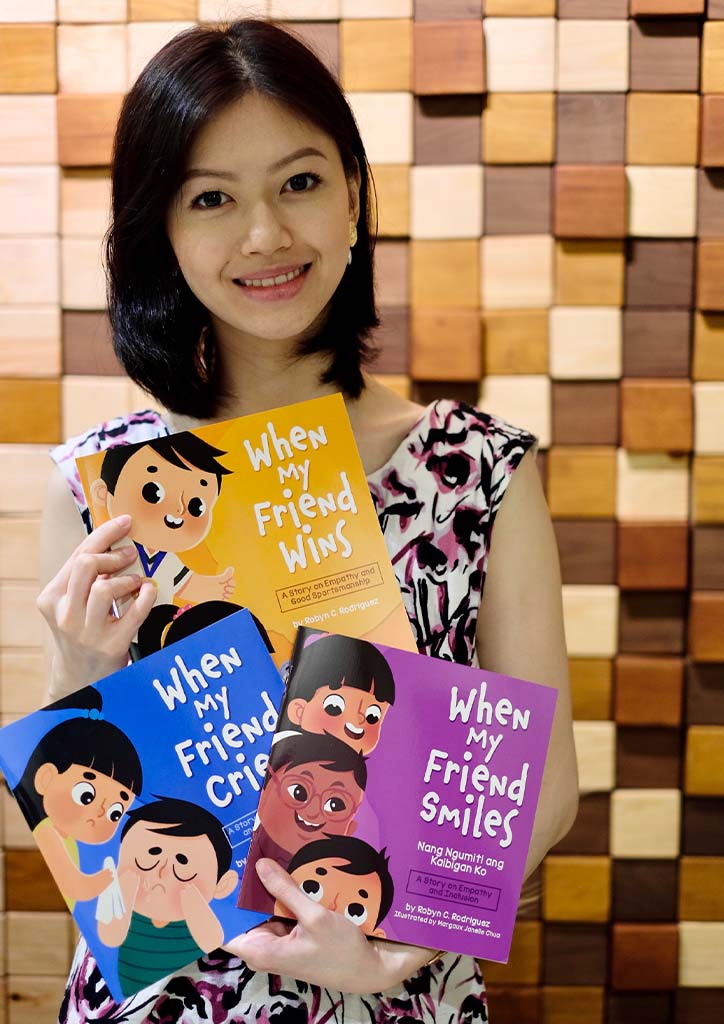Kids
When My Friend Wins: Learning with Robyn Chua Rodriguez
Mom Valerie Villar-Zayco shares why she loves the lessons her son learns from Robyn Chua Rodriguez’s When My Friend Wins series
With online distance learning, pre-school children may be learning how to add and how to spell, but what about important social skills such as getting along with peers, sharing and empathizing with others? In my search to find ways to teach my young child some of these important life lessons, I came across the book When My Friend Wins by Robyn C. Rodriguez. The book talks about what happens during Gail’s P.E. class and how the little heroine handles her emotions and her relationship with her friend when the outcome of the race did not favor her.
When My Friend Wins, is actually one in a series of books that center around two main characters Gail and Pablo. While they are the best of friends, their relationship isn’t perfect. Together, they are learning how to be kind and considerate to one another and to their peers as they go through different life experiences.
The author, Rodriguez, is a graduate from UP Manila with a bachelor’s degree in Speech Pathology. As a Speech-Language Pathologist who works mainly with pediatric clients, she evaluates and treats children with communication, speech, or language disorders. She initially wrote the story just so she could use it with her clients during therapy. “I saw that there was a need for social stories for my clients, specifically a story about sportsmanship,” Rodriguez had several students who had Autism Spectrum Disorder (ASD) and they struggled in this aspect.
When My Friend Wins: Where can kids learn about empathy

“I wanted to create stories that talk about relevant and relatable social situations all children experience. I want the books to show them how to respond the right way in these different scenarios.” The book is not preachy. You will not find an adult correcting the child and telling her what she should do, “Instead, you will see in all my books that the main character Gail is guided by an adult and given time to reflect on her actions. Gail pauses to notice how her friend is feeling, and she realizes on her own how her actions contributed to this. Gail then problem-solves and figures out a way to make things better.”
Rodriguez’ other book When My Friend Cries, shows the reader what it means to be a true friend who speaks up and does the right thing while When My Friend Smiles demonstrates how to treat each other’s differences with respect rather than judgment.
Our children have been locked down for roughly a year and a half. Although this has limited the number of interactions kids are able to have with other people, Rodriguez reminds us that empathy is best learned at home. “When parents communicate how they feel and explain the reason behind it, children become more aware of these emotions. When we model asking different family members how they are doing, we are showing our children that other people have feelings that we may not know of. This simple act shows them that we should take time to notice others and show concern. When we read stories together with our kids, we can make inferences about how certain characters feel. This way, we help build their reasoning skills and their ability to understand the different emotions of others.”
Rodriguez also says that when we watch the news or age-appropriate films with our children, we can process with them afterwards and talk about how those people must be feeling and what they are going through.
“Empathy can be intentionally taught at home in our everyday interaction with our children,” Rodriguez shares, “The key is we take time to notice others. Once we have that genuine concern, we can put ourselves in their shoes and feel what they feel. Empathy should always lead to acts of kindness and compassion.”
The lessons taught in Rodriguez’ books are some of the most significant interpersonal skills which children usually hone in social settings and in interacting with peers. Parents may worry that going to school “online” versus in person might affect their kids’ ability to develop these particular social skills. Rodriguez believes that it is definitely a challenge because online distance learning does somehow limit their socialization with others however she thinks that there are ways to make up for this limitation. Her advice for parents is that they should find ways to give their children more opportunities to interact with their friends.
“For example, parents can schedule regular online play dates for their kids so they can catch up with a few friends and share to each other how they are coping during this time. Parents can also model to their children that they make time to video call family members and relatives to ask how they are doing and they can encourage their kids to video call grandparents and cousins for some social interaction. They can also make it a practice to involve their children in intentionally doing acts of kindness for others. We are living in a very difficult time and this pandemic is in fact a great opportunity to teach children empathy.”
To teach and experience empathy with her daughter
As a mother of a little girl, Rodriguez says that she loves discovering things about her daughter as her personality surfaces. “I love conversing with her. Even if she’s just 2, she loves to talk and we always enjoy reading books together. I am just so blessed to be able to experience this kind of love from her. I see motherhood as a gift and as a stewardship. God has entrusted me with a precious life.
My daughter is His first before she is mine. My main responsibility is to raise her to know and love her Maker so she can become the person God wants her to be.”
To introduce your kids to Gail and Pablo and for more information on the books of Robyn Rodriguez, visit www.gailandpablo.com.
When My Friends Win is such a cute book! Need more book choices? Check out our list!
MP’s Best Kid-Friendly Books For Summer Reading
Georgia’s book is just the cutest to teach your kids about the Philippines!
6 Books to Jumpstart Your Child’s Love for Reading





